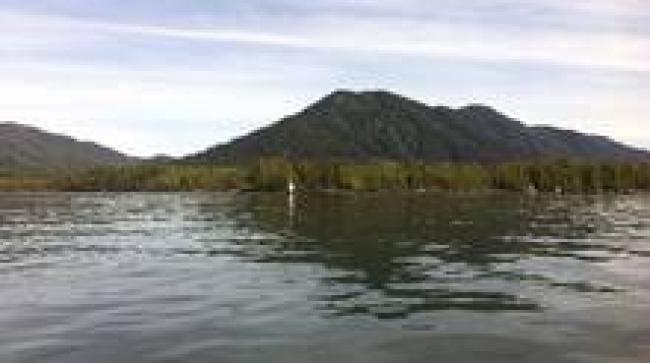Articles Menu

A new study co-authored by six British Columbia First Nations warns that a proposed terminal for exporting liquefied natural gas on the province’s northern coast poses a threat to salmon habitat in the Skeena River estuary.
The research argues Pacific NorthWest LNG’s planned terminal on Lelu Island will harm Flora Bank, where juvenile salmon are nurtured by eelgrass beds. Flora Bank, a sandy area that is visible at low tide, is next to the proposed LNG site near Prince Rupert.
The co-authors say their research found that if the project forges ahead, there would be damage to the ecosystem, including impacts on spawning locations upriver. The findings are contained in a letter published in the academic journal Science.
“The Skeena watershed is united by salmon,” said the letter, signed by nine authors, including fisheries experts from six aboriginal groups. “First Nations throughout the watershed should be involved in decisions that could damage their fisheries.”
Last November, four First Nations argued Pacific NorthWest LNG picked the wrong place to locate an export terminal. The Wet’suwet’en, Gitanyow, Lake Babine and Gitxsan said a fresh plan for a suspension bridge poses environmental risks that were not properly evaluated. Those four groups participated in the new study. They say their views were largely ignored because their land and title is farther away from Lelu Island than other First Nations.
The Takla Lake Nation and the Lax Kw’alaams also took part in the research. In voting in May, members of Lax Kw’alaams declined to provide aboriginal consent by overwhelmingly rejecting Pacific NorthWest LNG’s $1-billion cash offer over 40 years. The consortium is led by Malaysia’s state-owned Petronas.
Jonathan Moore, a fisheries biologist who is an associate professor at Simon Fraser University, is one of the co-authors, along with two members of the aboriginal-backed Skeena Fisheries Commission.
“The Flora Bank region in the Skeena estuary is like Grand Central Station for salmon,” commission head scientist Allen Gottesfeld said in a news release.
“The key point is that we recognize the connection between the estuary, Flora Bank and the upriver salmon,” Mr. Moore added in an interview Thursday. “Pacific NorthWest LNG has changed its plans, but the project would still be a huge transformation of the area.”
Pacific NorthWest LNG proposed last October to build a suspension bridge that would extend southwest for 1.6 kilometres away from Lelu Island, which is part of the traditional territory of the Lax Kw’alaams. The suspension bridge, which would connect with a 1.1-kilometre-long jetty, is designed to vastly minimize dredging and avoid damaging the eelgrass beds for salmon in Flora Bank.
The Petronas-led consortium has said that it carefully assessed 20 sites and selected Lelu Island from a shortlist of five locations. “Lelu Island is an unused site currently designated for industrial development by the Prince Rupert Port Authority,” Pacific NorthWest LNG said in a regulatory filing in December. The filing noted that the bridge “is the preferred option due to reduced potential effects of the project on the environment.”
In June, Pacific NorthWest LNG granted conditional approval for its project, subject to ratification of an LNG bill by the B.C. Legislature and receiving clearance from the Canadian Environmental Assessment Agency. The regulator is expected to issue a final decision some time after the Oct. 19 federal election.
The B.C. Liberal government used its majority in late July to push through an LNG bill. The bill’s passage also resulted in the ratification of a project-development agreement between the government and Pacific NorthWest LNG.
Last month, five other First Nations joined forces to assess the environmental impact of B.C. liquefied natural gas exports proposed for the Prince Rupert region. The Metlakatla, Kitselas, Gitxaala, Kitsumkalum and Gitga’at are members of the newly formed Tsimshian Environmental Stewardship Authority.
In December, Metlakatla and Kitselas signed impact-benefit agreements with Pacific NorthWest LNG.
[End of article]